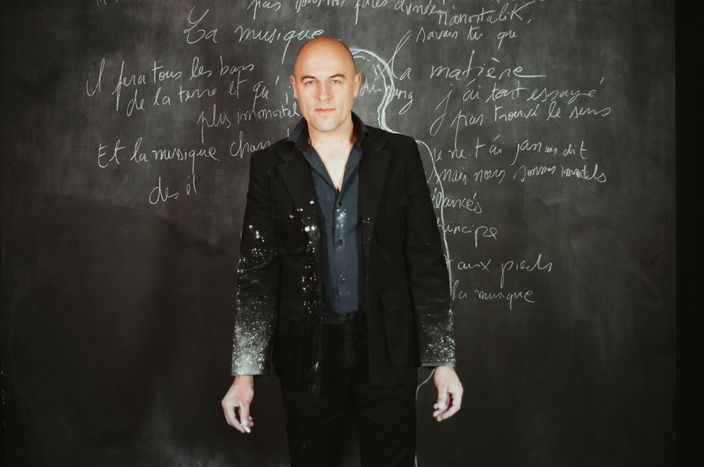
Dominique A: 'Singing in English doesn’t feel natural'
Published on
Translation by:
 Darren Thompson
Darren Thompson
As a front runner in the race to modernise French music, the 41-year-old shuns old stereotypes and overnight trends. His two-disc album 'La musique/ La matière' is out now
At the Route du Rock de Saint Malo Festival, held on the Brittany coast, the motto is quality over quantity. Last year Dominique Ané’s set was stripped back to be as minimalist as possible – just the man himself, a drum machine, a synthesiser and a guitar. No-one else up on stage. This reflected the style of his gigs at the start of the decade, in which he would fuse various sounds together to create the illusion of an orchestra being present. Although, in his latest set, the sounds are even more synthetic and repetitive. Nonetheless, this doesn’t deny Dominique A the status of a privileged songwriter, who has taken the French language to places that others daren’t dream. 'I think it’s all about personality,' he says, just a few hours before he takes the stage at Fort de Sant-Pierre, following in the footsteps of Americans Bill Callahan and Andrew Bird. 'If you sing pop-rock in French with guitars, it’s difficult to get out of an unnatural register. In my case, it didn’t take long for me to feel comfortable with French. Growing up, I started writing in English and I realised it didn’t feel natural.'
17 years
Dominique A was born in the commune of Provins near Paris, but grew up in Nantes. He bought a 32-track digital recorder despite his reservations about technology, and started to record tracks alone, resulting in his first album La Fossette ('The Dimple', 1992, Lithium). It would take seventeen years to perfect his craft. 'I didn’t think about finishing this album like that. I had thought about collaborating with other musicians. In reality, I was kidding myself – I wanted to get to the end of the album myself and see how I had developed in comparison to when I started out. It was also a way to rediscover the sound of La Fossette and, at the same time, to escape. A song like Immortels could perfectly have appeared on an album like Tout Sera Comme Avant ('Everything will be like Before', 2004, Labels),' he says, of an album which was released in a period when the artist was breaking away from his indie roots. He was collaborating with the same producers as the late Alain Bashung, but he also worked with the Bulgarian Symphony Orchestra. With the more experimental L’horizon ('The Horizon', 2006, Olympic Disk). Dominique A returned to more familiar territory, working with Dominique Brusson at his Brussels studio.
The end product is La Musique, Dominique A's first commercial release featuring a total of twelve songs, starting with Le Sens and Immortels. A bonus limited edition includes a second album, La matière, which features another twelve tracks. La Matière is far more experimental, although Dominique A’s endless expressivity ends up exceeding the limits that he himself established. 'The concept behind La Musique was to reach as large an audience as possible, to not exclude anyone by focusing on one small specialist group. It’s not what I have achieved, but I don’t expect to specialise any further,' admits the musician, who doesn’t seem too bothered by the reaction.
Dominique A’s endless expressivity ends up exceeding the limits that he himself established
'The album is selling well, although it will never be anything more than an independent success,' he continues. 'I’m not complaining. It allowed me to record the second album, which enabled me to deal with more complex issues that I didn’t want to sacrifice because they are important to me too.' With La Musique/ La Matière, Dominique A has synthesised two phases where he was able to work in freedom, in full creative flow as a writer, and appearing with others in the concerts that he wants.
Prolific songwriter
'When an artist works alone, he or she can radically change their sound from one day to the next, because you don’t have to have a discussion with a band. You don’t have to consult anyone else,' the musician happily states. He has collaborated with a large range of artists, including Katerine, Françoiz Breutz, Jane Birkin, Jeanne Balibar, Yann Tiersen, Vincent Delerm, Psykick Lyrikah, Calogero, in distinct lineups and formats for each album and tour.
This time, Dominique A has chosen Sébastien Buffet (Autour de Lucie) as the drummer, David Euverte on the keyboard, and guitarist/ keyboardist Thomas Poli (Montgomery). Of the three, only David Euverte has worked with Dominique on the L’Horizon tour, which resulted in the release of the 2008 book Un bon chanteur mort ('A Good Singer Dead', 2007). 'We haven't used wind instruments this time,' Dominique says. 'In fact, during the last tour, the drums were a trumpet, and the percussion was pretty low-key. That gave it a primitive touch.' Dominique A is now promoting a 'truly pop-rock' sound. His tour kicks off in October and continues until spring 2010 in France, with stops in Belgium and Spain (exact dates yet to be announced). Meanwhile, his label Cinq 7 have released a four-track EP, Kick Peplum, in case anyone wants to follow the frenetic pace of this musician at the height of his game.
Translated from Dominique A: “Si quiero, puedo cambiar de un día para otro”


